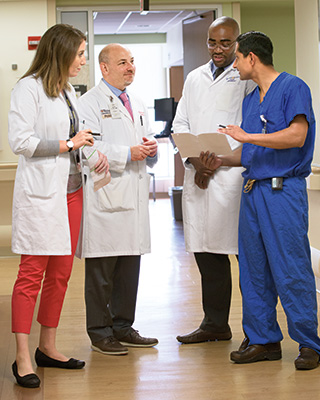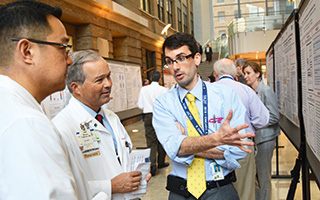Residency stresses safety, quality improvement

The General Surgery Residency has stayed a step ahead of regulatory requirements for reducing duty hours and trends in skills training, simulation and curriculum development. Efforts to create a culture of patient safety and quality improvement (PS/QI) follow a similar trajectory: The residency was poised to meet recent Accreditation Council for Graduate Medical Education (ACGME) guidelines as the accreditation body rolled them out.
“The ACGME General Surgery Milestones require that residents have experience in PS/QI, and the higher-level milestones require them to be actively involved in projects to improve patient care,” says Residency Program Director Paul Wise, MD.
Multiple layers have emerged as Wise, Associate General Surgery Residency Program Director Jason Wellen, MD, MBA, and department faculty continue to build a residency culture in which PS/QI is a central focus:
- The residency has a curriculum that includes lectures on principles of PS/QI every year. Another four lectures on topics such as problem-based quality improvement and the elements of a patient-safety culture occur over a span of two years. Both residents and faculty attend the presentations.
- Morbidity and mortality (M&M) conferences, held weekly among faculty and trainees to discuss patient-care mistakes, no longer focus solely on poor outcomes, but also on near misses, which present an opportunity for quality improvement. Residents create fishbone or Ishikawa diagrams to visualize contributing factors and identify root causes.
- All residents and fellows in the Department of Surgery are required to participate in PS/QI projects during their training. In addition, they are encouraged to present their projects at the department’s annual PS/QI poster session.
- As part of the American College of Surgeons National Surgical Quality Improvement Program® (ACS NSQIP®) Quality in Training initiative, Wellen shares outcomes data with residents regarding their own surgical cases. The program prepares residents for evaluating their performance as independent surgeons.
“We have become much more intentional with our focus on PS/QI and making sure it becomes routine,” says Wise. “Residents must have an understanding of how they can ensure better outcomes for their patients.”
Highlights

GENERAL SURGERY RESIDENTS received recognition for their contributions to patient safety and quality-improvement (PS/QI) projects. Kerri Ohman, MD, presented data from a colorectal early recovery after surgery protocol at the American College of Surgeons National Surgical Quality Improvement Program® (ACS NSQIP®) Annual Meeting in July 2016. The department honored Shuddhadeb Ray, MD, for a poster on minimizing complications of laparoscopic gallbladder removal. Barnes-Jewish Hospital recognition went to Jessica Hudson, MD, MSc, for work on office-based spirometry, and to Jennifer Yu, MD, MPHS, Wen Hui Tan, MD, and Jared McAllister, MD, for their research on postoperative opioid prescribing practices.
A GUN-VIOLENCE PREVENTION and ethics session for the department, led by trauma surgeon Laurie Punch, MD, associate residency program director, included breakout sessions in which residents discussed actual cases. Douglas Schuerer, MD, director of trauma for Barnes-Jewish Hospital, and other members of the acute and critical care surgery section also participated. Punch and Schuerer are active in community efforts to curb gun violence in the city of St. Louis.
AN ONLINE WELLNESS RESOURCE for residents, developed by minimally invasive surgeon Arghavan Salles, MD, PhD, offers counseling services, crisis lines, information on coping with adverse events, resources regarding family life and fitness, and other tools. Salles became active in wellness issues as a resident at Stanford University after the suicide of a residency graduate spurred efforts to improve residents’ well-being. Salles has also published papers on resident wellness, and Time magazine featured her work in an article titled “Doctors on Life Support” about physician stress and burnout.